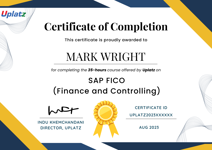
Business Architect Career Path
Self-paced videos, Lifetime access, Study material, Certification prep, Technical support, Course Completion Certificate
Uplatz
Summary
- Uplatz Certificate of Completion - Free
Add to basket or enquire
Overview
Uplatz provides this powerful and extensive Career Path program to help you become a Business Architect. It is a program covering all topics related to business strategy, enterprise architecture and business analysis in the form of self-paced video tutorials. You will be awarded Course Completion Certificate at the end of the course.
The Business Architect career path program consists of the following courses:
- Business Finance and Financial Modeling
- Cost and Management Accounting
- Leadership and Management
- Product Management
- Project Management Fundamentals
- SAP BPC (Business Planning and Consolidation)
- Business Intelligence and Data Analytics
- Microsoft Excel
- Google Sheets
- SQL Programming
- Tableau
- Power BI
- SAP BusinessObjects (BO) Business Intelligence
A business architect is a professional who plays a crucial role in aligning an organization's business strategy with its operational processes, technology systems, and overall structure. Business architects bridge the gap between business and technology by understanding the organization's goals and translating them into actionable plans and strategies. They focus on optimizing business processes, improving efficiency, and ensuring that technology solutions are aligned with the organization's objectives.
Here are the roles and responsibilities of a business architect:
Strategy Alignment:
- Collaborate with business stakeholders to understand the organization's strategic goals and objectives.
- Identify how technology and processes can support and enable these goals.
- Develop a clear understanding of the organization's current state and future vision.
Business Process Analysis:
- Analyze and document existing business processes, identifying inefficiencies and areas for improvement.
- Propose and design optimized business processes that align with strategic objectives.
Requirements Gathering:
- Engage with various business units to gather and document requirements for new projects or initiatives.
- Translate business needs into clear and actionable specifications for technology teams.
Solution Design:
- Collaborate with technical teams to design solutions that meet business requirements and align with the organization's architecture and standards.
- Ensure that technology solutions are scalable, flexible, and sustainable.
Change Management:
- Assist in managing the organizational change that comes with implementing new processes or technologies.
- Communicate the benefits of changes and address concerns from stakeholders.
Communication and Collaboration:
- Act as a bridge between business stakeholders and technology teams, ensuring effective communication and understanding.
- Collaborate with project managers, business analysts, and other stakeholders to ensure successful project delivery.
Governance and Standards:
- Establish and enforce best practices, standards, and guidelines for business processes and technology solutions.
- Ensure that solutions align with regulatory and compliance requirements.
Data Analysis and Modeling:
- Analyze and model business data to ensure that data flows and structures support business processes and reporting needs.
Risk Management:
- Identify potential risks and challenges associated with business process changes and technology implementations.
- Develop mitigation strategies to address these risks.
Continuous Improvement:
- Monitor and assess the performance of implemented solutions to identify opportunities for further optimization and enhancement.
- Stay informed about industry trends and emerging technologies that could benefit the organization.
Stakeholder Management:
- Build and maintain relationships with key stakeholders across different business units and levels of the organization.
Training and Education:
- Provide training and education to business users on new processes and technology solutions.
Overall, a business architect's role is to ensure that an organization's business strategies and technology solutions are closely aligned, leading to improved efficiency, better decision-making, and the achievement of strategic goals.
Certificates
Uplatz Certificate of Completion
Digital certificate - Included
Course Completion Certificate by Uplatz
Course media
Description
Becoming a business architect involves a combination of education, skills development, experience, and networking. Here's a step-by-step guide on how to pursue a career as a business architect:
Educational Foundation:
- Start with a bachelor's degree in a related field such as Business Administration, Management, Information Systems, or a similar discipline. Some business architects also come from technical backgrounds like Computer Science or Engineering.
Gain Professional Experience:
- Begin your career in roles that provide exposure to business processes, project management, or business analysis. This experience will help you understand the practical aspects of how organizations operate.
Develop Relevant Skills:
- Develop skills in business process analysis, enterprise architecture, strategic planning, data analysis, project management, and communication.
- Familiarize yourself with business process modeling tools, data modeling techniques, and enterprise architecture frameworks like TOGAF or Zachman.
Learn About Business Architecture:
- Invest time in learning about the principles and practices of business architecture. Books, online courses, webinars, and workshops can be valuable resources.
Certification:
- Consider obtaining certifications related to business architecture. The "Certified Business Architect" (CBA) certification from the Business Architecture Guild is a recognized credential in the field.
Advanced Education (Optional):
- Pursue a master's degree or relevant certifications such as an MBA (Master of Business Administration) or a master's in Information Systems to enhance your knowledge and credentials.
Networking:
- Join professional organizations related to business architecture or enterprise architecture. Attend conferences, workshops, and networking events to connect with professionals in the field.
Apply for Business Analyst or Business Architecture Roles:
- Seek job opportunities that involve business analysis, process improvement, or enterprise architecture. These roles will provide hands-on experience in working with business processes and technology alignment.
Showcase Your Skills:
- Create a strong resume that highlights your relevant skills and experiences. Tailor your resume to emphasize how your background aligns with business architecture.
Continuous Learning:
- Stay updated with industry trends, emerging technologies, and best practices related to business architecture.
Mentorship and Guidance:
- Seek mentorship from experienced business architects or professionals in related roles. Their insights can provide valuable guidance in shaping your career.
Demonstrate Leadership and Initiative:
- As you gain experience, take on leadership roles in projects that involve business process optimization, strategic planning, or technology alignment.
Portfolio Development:
- Build a portfolio of projects that showcase your ability to analyze business processes, develop strategies, and align technology solutions with business goals.
Remember that becoming a business architect is a journey that requires dedication and continuous learning. While there isn't a strict linear path, combining education, experience, skills development, certifications, and networking will help you build a strong foundation for a successful career in business architecture.
Who is this course for?
Everyone
Requirements
Passion and determination to achieve your goals!
Career path
- Business Architect
- Enterprise Architect
- Solution Architect
- Business Process Analyst
- Business Systems Analyst
- Business Analyst
- IT Strategist
- Business Transformation Manager
- Digital Transformation Specialist
- Business Process Manager
- Business Operations Analyst
- Process Consultant
- IT Business Partner
- Business Strategy Consultant
- IT Director or Manager
- Product Manager
- Business Relationship Manager
Questions and answers
Currently there are no Q&As for this course. Be the first to ask a question.
Reviews
Currently there are no reviews for this course. Be the first to leave a review.
Legal information
This course is advertised on reed.co.uk by the Course Provider, whose terms and conditions apply. Purchases are made directly from the Course Provider, and as such, content and materials are supplied by the Course Provider directly. Reed is acting as agent and not reseller in relation to this course. Reed's only responsibility is to facilitate your payment for the course. It is your responsibility to review and agree to the Course Provider's terms and conditions and satisfy yourself as to the suitability of the course you intend to purchase. Reed will not have any responsibility for the content of the course and/or associated materials.



